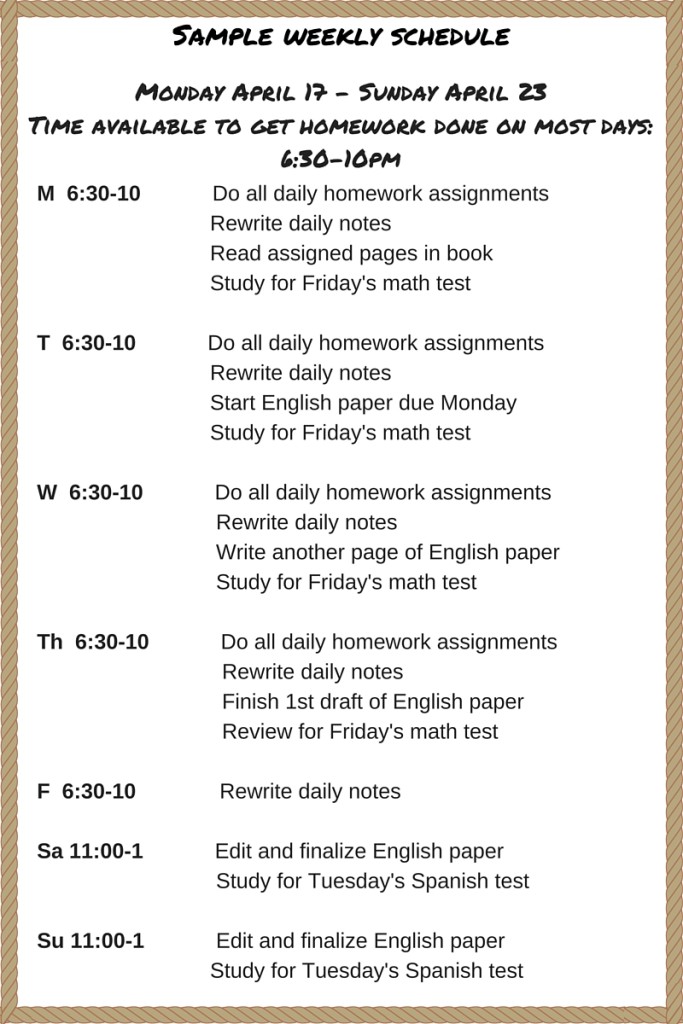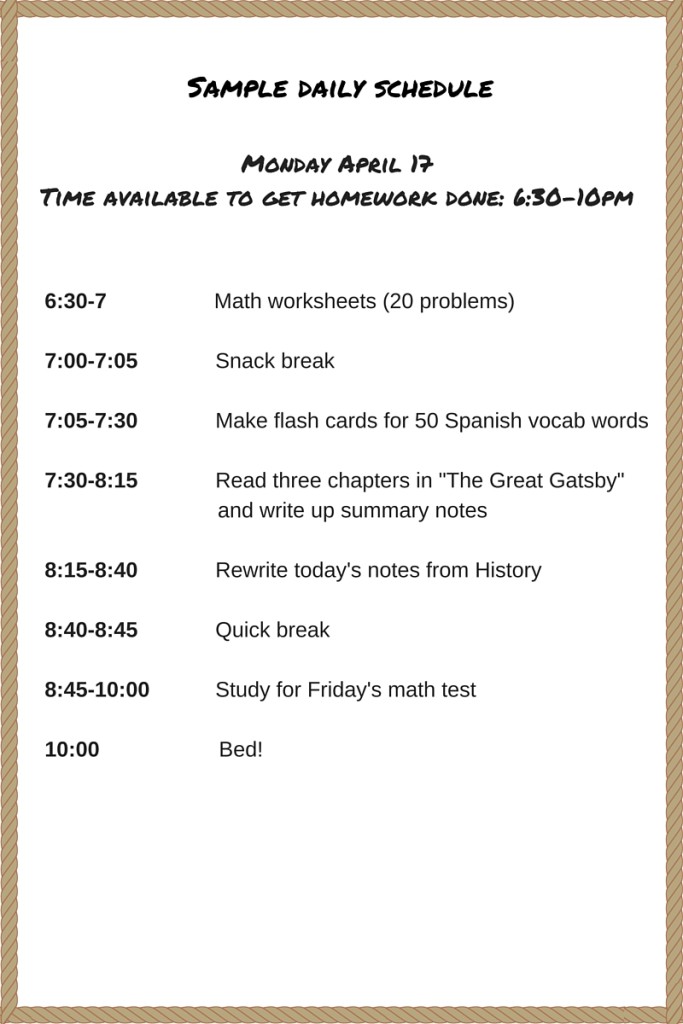High school can be one of the busiest times of your entire education. You’re not only juggling classes, but also everything else that comes along with the age: sports and other extracurriculars, social activities, standardized tests, college searches, etc. And it’s not as if you have all day to accomplish these tasks – you’re actually in school for most of the day. So it is no wonder that so many of you are stressed out, pulling all-nighters, and barely getting your homework done.
If this sounds like you (it totally sounds like me when I was in high school), then just trust me: you can get better at managing your time in one way or another. I did! (But not until senior year. Oops.)
Before I get to the strategies for finding time to do your homework, I just have to mention the importance of creating a proper workspace. This might be your bedroom, a den, your school library – anywhere that’s quiet and distraction-free. Not a good idea to set up shop at the kitchen table if that’s Grand Central Station at your house. Wherever you choose to make your workspace, make it awesome: have plenty of supplies so you don’t have to stop what you’re doing to find a pen. Make sure there is no TV in sight, and if you’re using your computer, stay off social media and the fun stuff until you’re done with business. (If your social media self-discipline is weak, try an app like SelfControl (free) or Freedom ($10), which block certain sites when you activate the program. Deactivate the program when you’re done with your homework if you want.) I suggest using the same workspace every day if you can. Over time and with consistency, your brain and body will automatically switch to “homework mode” the moment you sit down at your workspace. Humans are cool like that.
So how do you actually find the time to get your homework done?
1. The first step to managing your time is to figure out how many hours you really have left after school and after any of your after-school activities. (By after-school activities, I mean things like practice, dance, horseback riding, work, etc. – not hanging out with friends, which is something we’ll get to later in this post.) Sit down with a calculator and a calendar and do the math to figure out how much time you really have to work on homework/studying on Monday through Friday. For instance: If you have field hockey practice right after school until 5pm during the week, and your ideal bedtime is 10pm, then you have 5 hours a day to work on homework. Well, not really, because unless you sleep at school, you might not get home until 5:30, then you probably shower and eat dinner, and that brings you to 6:15. So that leaves you with 3 hours and 45 minutes to work on homework. Knowing exactly how much time you’re working with is crucial to knowing how to manage it.
2. Schedule your tasks and write down everything that needs to get done in the amount of time you have. You might find it helpful to create two different schedules — one general schedule at the beginning of the week (to plan out your week in advance) and another schedule every single day after school. Some days you’re going to have more homework than other days, so I really do recommend taking 10 minutes every single day, before you begin your homework, to plan out the afternoon and evening.
Here’s some tips for creating your schedules:
- Write down all your to-dos for the day, whether you have actual assignments and papers, you need to study for a test, or you have to read a certain amount in a book.
- Next to each assignment, write how long you think it will take you. Obviously it’s just an estimate, as you’re not psychic, but take an educated guess. Err on the side of giving yourself more time than you think you need.
- Budget time to study for upcoming tests. If it’s Monday and you have a statistics test on Thursday, then maybe give yourself 30 minutes to study on Monday, Tuesday and Wednesday. An hour and a half spread out over three days is better than binge-studying the night before.
- Budget time to re-write or type any notes you took during the day. This shouldn’t take long at all, but check out my blog post about note-taking, and how typing up notes and “filling in the gaps” should be done the same day you take your notes.

Sample Weekly Schedule

Sample Daily Schedule
3. Finally, get to work. Do the quicker tasks first. In other words, attack your one-page Spanish worksheet and your five math problems before you write the first draft of your history essay. Completing the smaller, quicker items first allows you to focus the rest of your time on your larger task, without the distraction of knowing you still have other things to do.
As you complete items, cross them off your list. (So satisfying!) If you want, give yourself a 5-minute break between each item so you don’t burn out. I’d recommend actually setting a timer for 5 minutes, because you know as well as I do that 5 minutes on Facebook turns into 30 minutes so fast.
If you complete an item in less time than you estimated, add that remaining time to the next task.
If a task takes you longer than you estimated, then see where you can make up that time. Either subtract time from other tasks, or as a last resort, move your bedtime back. I’m so hesitant to suggest moving your bedtime back, but sometimes there is just no way around it. Another possibility is to get up a little earlier the next morning to finish an assignment. But be realistic: if you’re a zombie in the morning and honestly don’t see yourself rising early to work on homework, then don’t force yourself. What works for one doesn’t always work for another.
I’ve got to mention procrastination here. If you struggle with procrastination, these tips can help you. There will of course be times when you will feel overwhelmed because all your teachers really did dump a ton of work on you at once. When this happens, just use every minute you have to plug away at at least something. Do the best you can. But there are other times when you’ll be overwhelmed because you saved everything to the last minute and you just realized it’s all due tomorrow. Although self-inflicted, your pain is just as real in these situations as in the other ones, and you will also just have to do the best you can do get through those moments. However …
… don’t procrastinate! Best lesson I ever learned in school, ever, was to start an assignment right away no matter how far away the due date was. In step 2, when you’re writing your daily list of tasks to get through, plan even just 20 minutes to start your English paper that’s due in a week. Plan just 15 minutes a day to read a few chapters in your book that’s due in two weeks. Take advantage of lighter homework days to make a dent in future assignments. Trust me – do it just once and it’s the best feeling ever to get ahead.
Also consider that evening doesn’t have to be the only time you get homework done; look for other pockets of time throughout your day to chip away at assignments.
Here are some sneaky extra sources of time that could be used to get homework done:
- free periods during school
- free time between the end of school and the beginning of practice
- bus rides to and from games and events
- car rides home or to wherever you’re going (as a passenger, of course)
- when you’re waiting for dinner to be served
- waiting rooms at doctor’s/dentists/whatever’s offices
- before school if you get there early
- after school when you’re waiting for your ride
Working on the weekends?
Weekends are of course for reenergizing (sleeping!), seeing friends and doing other non-school related activities. But, they’re also an excellent time to study for upcoming tests and to work on longer-term projects such as an essay due at the end of the week. Balance is important — so make sure you’re having some fun on Saturday or Sunday — but you’ll be doing yourself a huge favor by putting aside a chunk of time on one or both days to attack what needs to get done for the upcoming week. I suggest you work with your natural tendencies when figuring out when to work during the weekend. For instance, if you’re a morning person, do your work in the morning when your energy levels are higher. If you’re really not a morning person, then work in the late afternoons, before evening activities. Schedule this time into your weekends as if it’s a soccer game or a doctor’s appointment. Make it non-negotiable.
Managing your time well is the core of productivity. If you struggle with getting things done, get stressed about deadlines, and find yourself sacrificing your sleep because you have “so much work to do,” then you’re probably not managing your time well. Try the strategies outlined here – they’ll help you! And of course, if you need me to explain anything further, let me know!


